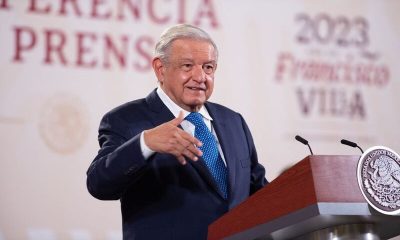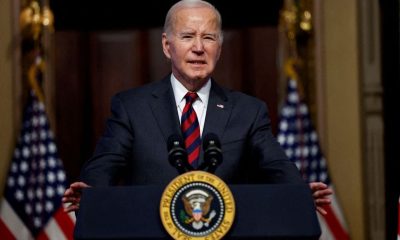POLITICS
Gun Control or Confederate Flags: Pick One
After the killings in South Carolina, pundits are divided on what they should talk about. Some have harped on the racial aspects of the case, manifesting itself in a debate over the acceptability of government agencies flying the confederate flag, while others are calling for increased gun regulations after yet another mass shooting.
So why can’t the pundits be split on which issue should take priority? Fighting on multiple fronts to reform two contentious policies will only lead to inaction. A united front on one policy topic doesn’t guarantee success by any means, but trying to tackle a multitude of issues simultaneously can only lead to inaction.
While both issues deserve attention, there are certain ways that progress can be maximized on all fronts.
The first and most complex issue raised from this shooting is race. While there is no legislative action that could eliminate racism or level the playing field, some have taken up a proxy war. Many are now calling for legislation to remove Confederate flags from government buildings.
As the Confederate battle flag continues to fly at full mast in Charleston, many have complained about its presence, citing racial prejudice that is inherently linked to its historical context. Referring to the flag as an emblem of hate, Cornell William Brooks, president of the N.A.A.C.P., said, “That symbol must be removed from our state capital.” While many Southerners claim it is exclusively a symbol for states-rights; that argument is clearly misguided. As for other arguments in favor of flying the flag, there is only one: it’s America so I can do what I want. Yes you can, but in accepting that there are racist overtones to the flag, government buildings probably should not be donning such a symbol.
If Confederate flags are banned, the symbolic victory would be decisive on the long road toward increased racial equality.
On the other hand, this shooting has renewed vociferous debate concerning gun-control legislation. After every mass shooting, a short-lived frenzy is sparked. Celebrities, politicians and common citizens rally around potential limitations on the acquisition of firearms. But without fail, the issue is forgotten in a matter of weeks and federal legislation dies with popular interest. Gun-control legislation is inevitable, but the question is when will the country be ready for it? Practical legislation is being thwarted by the antiquated second amendment and misguided arguments from conservative commentators like Chris Stirewalt of Fox News, “The legislation wouldn’t have prevented the shooting had it been in place.” Since it wouldn’t have stopped nine murders that have already happened, limiting the number of personal firearms sold in America is pointless because crazy people will always find a way to get a gun, right Chris? That’s how human behavior works? No! Limiting access to firearms inherently decreases the likelihood that a lethal weapon will end up in the wrong hands.
So what should we focus on, limiting confederate flags or firearms? Let’s weigh this conundrum in terms of practicality and importance. Considering the political climate and the fact that Republican primaries are around the corner, limitations on flying the Confederate flag are probably more likely to pass. Federal legislation for limitations on firearms will be nearly impossible, despite the fact that legal firearms kill 34 people for every one that they save.
That said, while legislation on Confederate flags would undoubtedly be symbolic and a great move for race relations, tangible impacts from this legislation would pale in comparison to restrictions on personal gun purchases and ownership. America is far behind the rest of the world on this topic. Most European countries do not allow for citizens to own a gun at all, much less military grade firearms. So while some continue to hide behind tradition, they forget that some traditions are antiquated for a reason.
While both fights have merit, America should chose to put its efforts into reforming the criteria for gun ownership rather than addressing the Confederate flag.
Image: Via Flickr/Dickson Phua
Geopolitics & Foreign Policy
Despair in Gaza as fighting intensifies despite Israel’s promise to scale back the war.
Israeli bombings in southern and central Gaza escalated on Wednesday, despite a commitment by Israel that it would withdraw some forces and transition to a more focused assault, as well as a beg from its partner Washington to decrease the number of civilian fatalities.
The Houthi movement in Yemen, which claims it is acting to help Gaza, launched the most significant strike to date against United States and British warships in the Red Sea. This is the most recent indication that the war, which has been going on for three months, is spreading. Both Washington and London have reported that they were successful in shooting down 21 missiles and drones that were intended for maritime channels. Nobody was wounded in the incident.
Following weeks of pressure from the United States to reduce its operations and transition to what Washington considers to be a more focused campaign, Israel said this week that it intended to begin bringing down forces, at least from the northern portion of Gaza.
However, it seems that the combat is as ferocious as it has ever been, particularly in the southern and central regions, which are the places where Israeli troops made ground gains a month ago.
In response to security concerns, the World Health Organization (WHO) decided to cancel a scheduled medical aid mission to Gaza. This is the sixth time in the past two weeks that such a mission has been canceled.
When an Israeli attack occurred on the major road near Deir al-Balah in the central Gaza Strip, the Palestinian Red Crescent reported that four of its employees were murdered. The strike occurred on the ambulance that they were riding in. The ambulance was carrying two people who were injured and eventually passed away.
More than 23,000 Palestinians have been murdered in Gaza since Israel began its effort to eliminate the Hamas terrorist group that rules the territory. This comes after Hamas members carried out a rampage on October 7 that resulted in the deaths of 1,200 Israelis and the abduction of 240 captives who were held captive.
Gaza’s health officials have calculated that almost forty percent of those who were murdered were under the age of eighteen.
Having lost their family home in an air attack that resulted in the death of their father, Laila al-Sultan, who is seven years old, and her brother Khaled, who is four years old, are currently residing in a tent shanty town in the southern region of Gaza.
“The house collapsed on us, and Daddy went to heaven, and he is very happy,” Khaled remarked as he bounced up and down on Laila’s lap. “The house collapsed on us.”
WARNING FROM HOUTHI
Antony Blinken, the Secretary of State of the United States of America, made his fourth trip to the area since the beginning of the conflict. On Wednesday, he traveled to Ramallah and met with Palestinian officials, including Mahmoud Abbas, the President of the Palestinian Authority (PA), in the West Bank, which is under Israeli occupation.
Even though it recognizes Israel’s right to exist and exercises limited self-rule in the West Bank, the Palestinian Authority (PA) lost control of Gaza in 2007. Hamas, which is committed to the destruction of Israel, took control of Gaza.
Blinken reportedly voiced his support for the establishment of a Palestinian state, emphasized the efforts being made to safeguard and assist people in Gaza, and advocated for “administrative reforms” to be implemented by the Palestinian Authority.
The Palestinian Authority (PA) said that Abbas advised Blinken that no Palestinians should be relocated from Gaza or the West Bank.
Furthermore, Blinken has spoken with officials from Israel and traveled to Arab governments in the vicinity to hunt for a potential settlement for the Gaza Strip and its population of 2.3 million people.
The meeting between Jordan’s King Abdullah and Egyptian President Abdel Fatah al-Sisi occurred in Aqaba on Wednesday. During the meeting, Jordan and Egypt issued a warning against any reoccupation of the Gaza Strip by Israel and made a request that inhabitants who had been uprooted be allowed to return to their homes.
Washington is concerned that the conflict in Gaza might spread bloodshed throughout the region, with armed organizations supported by Iran, Israel’s most opposed nation, unleashing strikes in Lebanon, Syria, Iraq, and Yemen in sympathy with Israel.
The Houthis, who control the majority of Yemen, have been bombing one of the busiest shipping routes in the world, which is located at the mouth of the Red Sea. As a result, the United States government has been forced to send warships to provide security.
According to a spokesman for the Houthi military, the group fired a large number of missiles and drones at a United States ship that was providing support to Israel. The spokesman referred to the attack as a “preliminary response” to an incident that occurred on New Year’s Eve, in which United States helicopters sank three boats carrying Houthi fighters who attempted to board a commercial vessel.
According to Blinken, who made this statement when he was in Bahrain, which was the next stop on his journey, there would be repercussions for ongoing attacks on commercial vessels.
“We’ve also repeatedly tried to make clear to Iran, as other countries have, that the support that they’re providing to the Houthis, including for these actions, needs to stop,” he said to reporters.
The no-let-up
Despite Israel’s public declarations since the New Year that it is reducing the intensity of the battle, the inhabitants of Gaza claim that they have not witnessed any reduction in the conflict. There has been at least one instance of the whole community being evicted from their houses, with many people being relocated many times as Israeli soldiers continue to advance.
The bodies of fifteen members of the Nofal family were laid out at a hospital morgue in Rafah, which is located on the southern fringe of the enclave. After an Israeli air strike overnight destroyed their home, the victims were there. Relatives wailed as they stared at the bodies.
The majority of the white shrouds were tiny, and they contained children. Um Ahmed, a mother of five now taking refuge in a tent near Rafah, stated that Gazans had anticipated Blinken’s presence would signal they would be allowed to return to their homes.
It is comparable to words written in butter, since it vanished as soon as the sun rose in the sky. She said, “Those were Blinken’s words, and they were fake.”
Geopolitics & Foreign Policy
The Maldives upgrades ties with China amid pivot from India.
The Maldives upgraded ties with China amid a pivot from India. Following a campaign in which he painted China’s regional rival India as a danger to sovereignty, newly elected President Mohamed Muizzu of the Maldives boosted ties with China on Wednesday on his first state visit to Beijing.
Speaking at the Great Hall of the People, Chinese President Xi Jinping referred to Muizzu as “an old friend” as the Asian behemoth agreed to a “comprehensive strategic cooperative partnership,” opening the door for more investment in the Indian Ocean archipelago.
Xi told Muizzu, “China and the Maldives’ relations are facing a historic opportunity to carry forward the past and forge ahead into the future,” according to Chinese official media.
After winning on his “India Out” platform, whereby he described New Delhi’s enormous influence as a danger to sovereignty, Muizzu assumed office in November. Despite being deeply indebted to Beijing, his administration has recently requested hundreds of Indian military troops stationed locally to leave while promoting opportunities for Chinese businesses.
Following a military skirmish in the western Himalayas in June 2020 that claimed the lives of 20 Indian and 4 Chinese soldiers, ties between the two countries plummeted.
China is paving the way for more investment in a region where India has already witnessed another neighbor, Sri Lanka, move closer to China by strengthening its relations with the Maldives.
Following the meeting, his presidential office said that “20 key agreements between the two countries” had been signed. “During the talks, President Dr. Muizzu expressed gratitude for China’s significant role in the Maldives’ economic success and infrastructure development,” the statement said.
According to World Bank data, the Maldives owes China $1.37 billion, or around 20% of its public debt, which puts Beijing ahead of Saudi Arabia and India, which owe $124 million and $123 million, respectively, as its largest bilateral creditors.
According to statistics from the American Enterprise Institute think tank, since the Maldives decided to join the Belt and Road Initiative in 2014, Chinese companies have made additional investments in the country totaling $1.37 billion.
According to official media, Xi stated, “China firmly supports the Maldives in safeguarding its national sovereignty, independence, and national dignity.” Plus, according to Xinhua, Beijing would be open to “exchanging experience of state governance” with Male.
Before meeting with Xi, Muizzu was shown a video on X, formerly known as Twitter, via his presidential office account. The video showed him touring the Chinese Communist Party Museum in Beijing.
In an October development assessment on the Maldives, the World Bank cautioned that further cozying up to China may be problematic since there was a “lack of domestic investment opportunities” and a “build-up of sovereign exposure” during the epidemic.
Xi stated that he supported more direct flights between the two nations, which might benefit the Maldives’ travel and tourist industry, which the Asian Development Bank estimates would account for 79% of the country’s economic development in 2022.
Geopolitics & Foreign Policy
Ecuador’s president says the country is at war as gangs hold prison staff hostage.
Daniel Noboa, the president of Ecuador, declared on Wednesday that his nation was “at war” with criminal gangs that had over 130 jail guards and other employees as hostages. He momentarily took over a TV station via live broadcast and detonated explosives in a wave of violence that has left significant streets desolate.
On Tuesday, Noboa designated 22 gangs as terrorist groups, designating them as recognized military targets. Upon assuming office in November, the president committed to addressing the escalating security issue stemming from an increase in drug-trafficking organizations smuggling cocaine via Ecuador.
Noboa declared on Wednesday, “We are at war and we cannot cede in the face of these terrorist groups.” Noboa declared a 60-day state of emergency in response to the hostage-takings, which started in the small hours of Monday, and the alleged weekend escape of Los Choneros gang boss Adolfo Macias from jail.
On Tuesday, following a string of explosions around the nation and a spectacular live-streamed takeover of a TV station by gunmen, he tightened the edict.
The government claims that Noboa’s proposal to construct two new, high-security prisons for gang leaders is the reason for the violence, and Noboa informed the radio station that the designs for the two new institutions will be revealed to the public tomorrow.
Noboa declared, “We are doing everything in our power to free all of the hostages,” adding that the military had assumed control of the rescue operation. “We are doing everything possible, and the impossible, to get them safe and sound.”
According to the SNAI prisons agency, 125 captives are guards, while the remaining 14 are administrative employees. It stated that eleven individuals were let go on Tuesday.
Social media users posted videos of prison staff members being shot and hanged, among other acts of horrific cruelty. Reuters could not immediately confirm the validity of the films. According to Noboa, the nation will start deporting foreign inmates this week, particularly those from Colombia, to lower the jail population and costs.
Approximately 1,500 individuals from Colombia are incarcerated in Ecuador, according to Noboa, who also stated that 90% of foreign inmates are from Colombia, Peru, and Venezuela.
Colombian legislation requires that repatriations be evaluated on a case-by-case basis and predicated on inmates’ petitions. Despite this, Colombia’s justice minister stated on local radio on Tuesday that he was eager to negotiate with Ecuador.
Like many other Latin American nations, Colombia has supported the Ecuadorian government. On Wednesday, the country said it would strengthen its military presence and control along their shared border, which spans over 600 kilometers (370 miles).
PERMANENT VIOLENCE
Noboa told the radio station that ensuring the rule of law and enhancing security would be the best ways to protect the economy and foreign investment.
On Tuesday, lawmakers endorsed Noboa’s initiatives and supported the armed forces. After his party formed alliances with a Christian party and the socialist movement of former President Rafael Correa, Noboa now leads a majority coalition in Congress.
Noboa stated, “I have asked for their support, but I don’t need their approval right now for what we are doing,” about the decrees. On Wednesday morning, Noboa also had a meeting in Quito with ambassadors to Ecuador.
The police reported on Wednesday that since Monday, there have been 70 arrests about various incidents, including the seizure of the TV station.
Four police officers are still being detained after criminals allegedly abducted them between Monday and Tuesday. Late on Tuesday, three more cops were released. The police were identifying the three victims found in a burned-out car overnight south of the capital and adding that there was still violence in Guayaquil, the country’s largest city.
On Tuesday, armed individuals killed two police officers in the province of Guayas, where Guayaquil is located. The cops did not offer any more information. On Wednesday morning, many shops were closed, leaving the streets of Quito and Guayaquil quiet.
A major Chinese investor in Ecuador said that the Chinese embassy and consulates would be temporarily shuttered. All around the country, schools were closed, but courses continued digitally. Locals reported feeling as though pandemic lockdowns were again in place.
“The streets are very empty; it’s horrible,” forty-year-old Rodolfo Tuaz, a security guard in Guayaquil, said. “It’s a frigid environment, as if there were a new COVID.”
-

 Geopolitics & Foreign Policy2 months ago
Geopolitics & Foreign Policy2 months agoTurkey’s Erdogan says he may visit Egypt soon, discuss Gaza patients -media.
-

 Europe3 months ago
Europe3 months agoRussia’s Shoigu accuses the West of seeking to expand the Ukraine war to the Asia-Pacific.
-

 Geopolitics & Foreign Policy2 months ago
Geopolitics & Foreign Policy2 months agoCeasefire takes hold in Gaza ahead of hostage release; aid enters enclave.
-

 Geopolitics & Foreign Policy2 months ago
Geopolitics & Foreign Policy2 months agoRussia deploys new nuclear missile in Kaluga region – RIA
-

 America4 months ago
America4 months agoRepublican US House to hold first Biden impeachment inquiry hearing
-

 Geopolitics & Foreign Policy2 months ago
Geopolitics & Foreign Policy2 months agoChina’s military: US Navy ship ‘illegally’ entered territorial waters
-

 Europe3 months ago
Europe3 months agoZelenskiy, at NATO HQ, asks for weapons to face winter of ‘terror’
-

 Agriculture4 months ago
Agriculture4 months agoIAEA, Japan agree on continuous safety review of Fukushima water


















